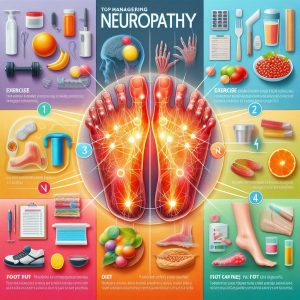Neuropathy Management Tips
Managing neuropathy is all about improving comfort, mobility, and quality of life. While neuropathy symptoms like pain, tingling, or numbness may be challenging, adopting the right strategies can make a significant difference. From lifestyle changes to advanced solutions, here are practical tips for managing neuropathy effectively.

1. Stay Active and Exercise Regularly
Gentle, low-impact exercises can help improve circulation, reduce pain, and enhance nerve function. Activities like walking, swimming, or yoga can also boost overall health. Tips for exercising with neuropathy include:
- Focus on low-impact movements to avoid putting pressure on sensitive areas.
- Incorporate stretching to maintain flexibility and reduce stiffness.
- Work with a physical therapist to tailor exercises to your specific needs.
2. Maintain a Balanced Diet
Nutrition plays a key role in managing neuropathy. A balanced diet can support nerve health and reduce inflammation. Key dietary tips include:
- Include foods rich in vitamins B12 and B6, such as fish, eggs, and leafy greens.
- Add antioxidant-rich foods like berries, nuts, and dark chocolate to fight oxidative stress.
- Limit alcohol and sugary foods, which can exacerbate nerve damage.
3. Prioritize Foot Care
For those with neuropathy, especially in the feet, proper care is essential to prevent complications. Practical steps include:
- Inspect your feet daily for cuts, sores, or signs of infection.
- Wear properly fitting footwear with adequate support and cushioning.
- Use specialized neuropathy socks to improve circulation and protect sensitive areas.
4. Manage Pain with Medications and Therapies
While there’s no single cure for neuropathy, various pain management strategies can help. Consider these options:
- Over-the-counter pain relievers or prescription medications recommended by a doctor.
- Topical treatments like capsaicin cream to reduce localized pain.
- Alternative therapies like acupuncture or nerve stimulation techniques.
5. Wear Specialized Neuropathy Socks
Neuropathy socks are designed to address specific needs related to nerve pain and discomfort. Their benefits include:
- Compression: Improves blood flow, reducing swelling and promoting healing.
- Cushioning: Adds extra protection for sensitive areas, preventing injury.
- Moisture-Wicking Fabrics: Keeps feet dry and reduces the risk of infections.
Combining neuropathy socks with other management strategies creates a holistic approach to symptom relief and comfort.
6. Manage Stress and Sleep
Stress and poor sleep can amplify neuropathy symptoms. Stress management techniques and good sleep hygiene are crucial for overall well-being. Tips include:
- Practice mindfulness, meditation, or breathing exercises to relax the mind and body.
- Establish a consistent sleep routine by going to bed and waking up at the same time each day.
- Make your sleeping environment comfortable and free of distractions.
Neuropathy Management Summary Table
| Category |
Key Actions |
Benefits |
| Exercise |
Walk, swim, or stretch daily |
Improves circulation and reduces pain |
| Diet |
Eat nutrient-rich foods and reduce sugar |
Supports nerve health and reduces inflammation |
| Foot Care |
Inspect feet, use specialized socks |
Prevents complications and improves comfort |
| Pain Management |
Try topical creams or alternative therapies |
Alleviates discomfort and promotes mobility |
| Stress/Sleep |
Practice relaxation techniques |
Reduces symptom severity and improves mood |



